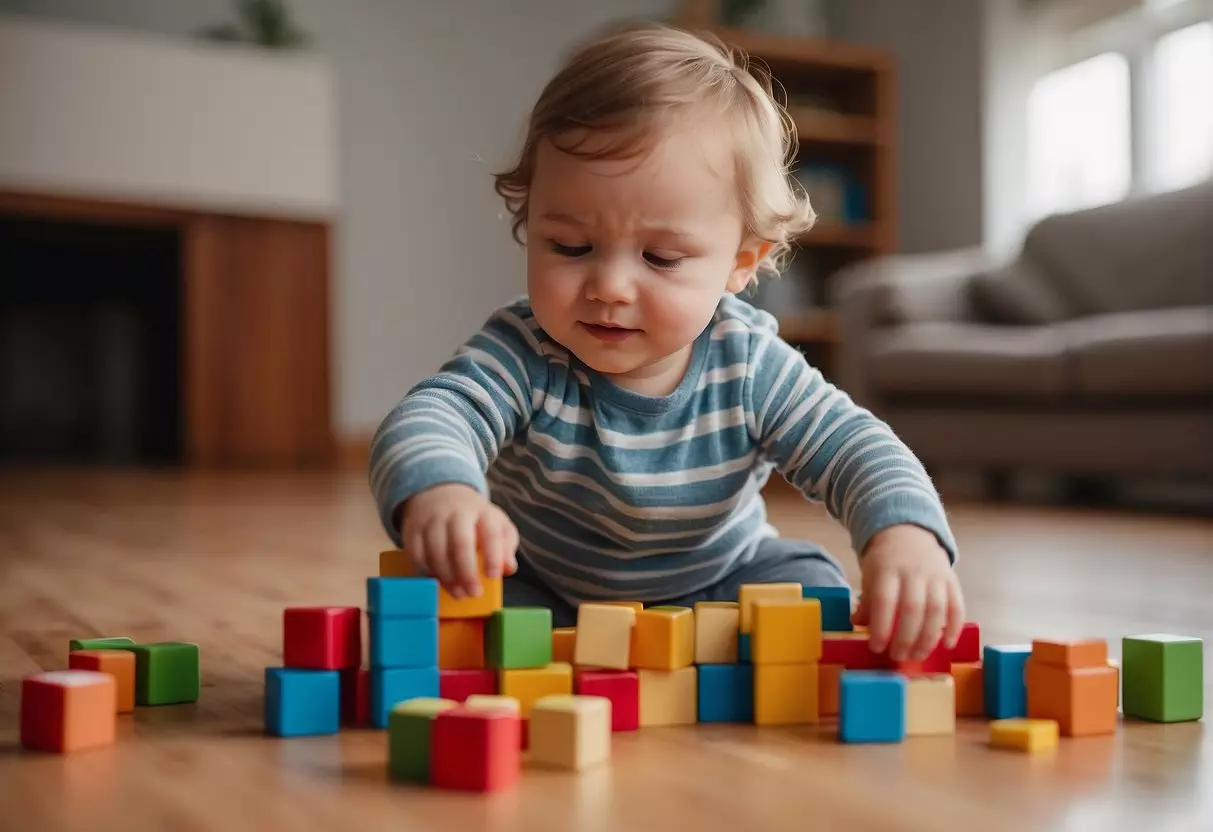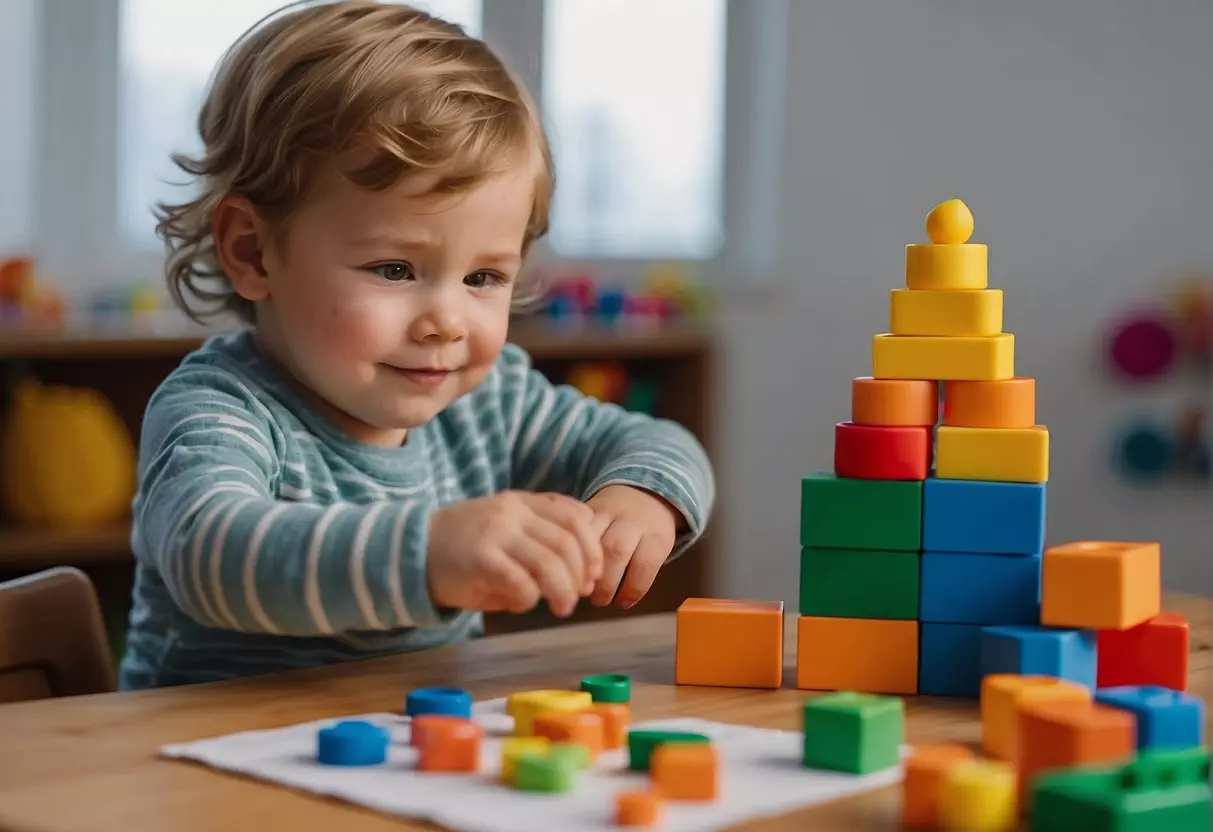Activities for a 30 Month Old: Engaging Fun for Toddlers
Engaging your 30-month-old with stimulating activities is a great way to support their rapid development. At this stage in early childhood development, your little one is rapidly expanding their social, language, cognitive, and motor skills. It’s an exciting time as you watch them grow from a curious toddler into an even more curious and active child.

Now is the perfect time to introduce new games and learning experiences that not only entertain but also encourage key aspects of child development. Whether it’s interactive play that hones their fine motor skills or language-rich activities that boost their ever-growing vocabulary, the activities you choose can be both fun and educational.
Remember, every child is unique, and their interests may vary, so it’s important to offer a variety of activities that cater to your 30-month-old’s individual development and preferences. From imaginative play to structured games, these engaging experiences will support their development and create joyous memories for both of you.
Table of Contents
Physical and Motor Skill Development
Developing physical and motor skills is a joyful and essential part of your 30-month-old’s growth. They’re mastering movements that will become the building blocks for a lifetime of active play.
Gross Motor Skills
Jumping: Your little one is probably able to jump off the ground with both feet now. This is not just fun but also important for developing leg strength and balance.
- Walking & Running: Expect confident walking and the beginning of running. You’ll notice an improvement in coordination as your toddler switches between speeds and directions.
Here’s a simple table to track gross motor milestones:
| Age | Milestone | Why It’s Important |
|---|---|---|
| 30 months | Jumping with both feet | Improves balance, coordination, and strength |
| 30 months | Stable walking to running | Enhances coordination, physical skills, and spatial awareness |
Fine Motor Skills
Fine Motor Control: By now, your toddler should be able to use their hands for delicate tasks. They may be turning a doorknob, twisting open a jar, or using tongs in play activities which promote dexterity.
- Coordination: Look for signs of hand-eye coordination. Your child might turn book pages one at a time, which is also a fantastic way for you to bond during storytime.
| Skill | Expected Milestone | Why It’s Useful |
|---|---|---|
| Hand manipulation | Turning a doorknob | Encourages independence and self-help skills |
| Eye-hand coordination | Turning book pages | Supports reading readiness and fine motor precision |
Your toddler’s motor skills, both gross and fine, are blossoming. Encourage them through play that promotes physical engagement and watch as they reach new heights in their capabilities.
Cognitive and Language Advancement
At 30 months old, your child is at a stage where cognitive and language skills are rapidly developing, opening a world of new understanding and problem-solving abilities. Through specific activities, you can help enhance their vocabulary and thinking skills.
Problem-Solving Activities
Incorporate problem-solving games to boost your child’s cognitive development. Puzzles with different shapes and colors not only entertain but also improve your little one’s ability to recognize patterns and solve problems. For instance, try a game where you ask your child to match colorful shapes, which encourages them to think critically and develops their cognitive skills.
- Matching Games: Find games with various objects or cards and ask your child to match them by color or shape.
- Sorting Tasks: Use household items to create sorting games, like sorting spoons and forks, to improve classification skills.
Language and Vocabulary Growth
Your child’s language development is accelerated by engaging in meaningful conversations and reading together. By naming objects and describing their attributes, you’re expanding your child’s vocabulary and understanding of the world.
- Interactive Reading: Choose books with bright pictures and ask questions about the story to involve your child and enhance their language skills.
- Daily Descriptions: Throughout the day, describe your actions and environment to your child using descriptive language, which helps grow their vocabulary repertoire.
Remember, the questions you ask and the words you introduce play a vital role in their language development journey. Encourage your child to express themselves and use their newly acquired language skills in everyday situations.
Social and Emotional Growth
Your little one is reaching new heights every day, especially in understanding and managing emotions. Social adventures like sharing and turn-taking are becoming key parts of their development.
Understanding Feelings
At 30 months, your toddler is becoming more aware of their own emotions and beginning to recognize them in others. This is the time when pretend play becomes more complex, as your child starts to act out different scenarios that reflect their budding emotional awareness. They might comfort a doll when it’s ‘sad’ or mimic your behavior during play. Encouraging this type of play helps to deepen their understanding of feelings, making it a critical component of positive parenting.
Sharing and Turn-Taking
Sharing and turn-taking are not just social niceties; they are essential skills your toddler needs to learn. At this stage, your child may struggle with these concepts, but routine games and activities can reinforce these behaviors. When your child plays with others, gently remind and guide them to take turns. Practice this at home with simple activities like rolling a ball back and forth, saying “Your turn” and “My turn” to clearly demonstrate the action of taking turns.
Remember, managing emotions during these activities can be challenging for your toddler. It is normal for some resistance to sharing toys or waiting for their turn, as these actions require a level of emotional regulation that is still developing. By providing calm support and praising their efforts, you can foster a safe environment for them to grow these vital social skills.
Helping your toddler navigate their emotions and interact with others through sharing and turn-taking will pave the way for a more empathetic and socially adept child.
Creative and Sensory Play
Creative and sensory play is a crucial part of your 30-month-old’s development. These activities not only nurture their imagination and creativity but also enhance their sensory perception and cognitive abilities. Let’s explore some engaging arts and crafts, as well as sensory play activities that can provide enriching experiences for your little one.
Arts & Crafts
For arts and crafts, simple projects can spark creativity. You might try:
- Handprint Art: Press your child’s hands into non-toxic paint and then onto paper to create memorable impressions.
- Collage Making: Tear up pieces of colored paper and let your toddler glue them onto a canvas or heavy paper to form unique designs.
Remember, at this stage, it’s more about the process than the end result. Encourage their artistic freedom and praise their efforts to build their confidence.
Sensory Play Activities
Sensory play taps into your child’s inherent curiosity and allows them to explore textures, smells, and more:
- DIY Playdough: Create homemade dough with flour, salt, water, and food coloring for tactile fun. Firmer doughs like playdough can be a great tool for hands-on learning.
- Water Play: Fill a plastic bin with water and various waterproof toys to engage your child in splashing and pouring. This can introduce basic STEM concepts like volume and cause-effect.
Incorporate Montessori practical life activities by involving your child in everyday tasks using sensory-rich materials, such as sorting beans by color or sweeping up crumbs with a small broom.
By intertwining playtime with creativity and sensory exploration, you’re creating a lovevery moment for learning. Indoor play with arts and sensory activities not only fills the day with fun but also strengthens your child’s developmental milestones.
Routine and Daily Life Skills

In your child’s growth journey, establishing a structured routine and nurturing daily life skills are key components for their development. These skills not only foster independence but also contribute to your child’s confidence and understanding of their role in the family dynamic.
Self-Help Skills
At 30 months, your child is ready to learn self-help skills that promote their ability to care for themselves.
- Dressing: Start by encouraging your little one to dress themselves with easy-to-wear clothing. Elastic waistbands and large buttons are your allies here. Celebrate every success to boost their confidence.
- Potty Training: Consistency is your best friend when it comes to potty training. Provide gentle reminders and look for cues that they need to go. Always provide positive reinforcement, making this a happy routine.
- Feeding: While feeding times can become battlegrounds for power struggles, especially with picky eating, provide healthy choices and involve your child in the selection. This can help them feel more in control and willing to try new foods.
Participation in Household Chores
Involving your toddler in household chores not only helps you but also instills a sense of responsibility and inclusion.
- Tidying Up: Make cleaning up toys a game and part of their daily routine. A tidying up song can signal it’s time to put things away.
- Helping in the Kitchen: Simple tasks like washing fruits or stirring ingredients are great ways to have your child help in the kitchen. Use this opportunity to discuss healthy eating or count ingredients for a mini math lesson.
- Feeding Pets: If you have family pets, allowing your child to help with feeding can develop a routine of caring and responsibility. Always supervise to ensure your pet’s dietary needs are met and use this time to teach your child about animal care.
Parental Guidance and Tips
When guiding your 30-month-old, you’re nurturing budding skills that range from physical coordination to the nuances of communication. At this stage, your toddler is learning rapidly, and your support is key to fostering healthy development.
Communication Skills:
Your little one’s vocabulary is expanding, and they may be stringing together words to express thoughts. Encourage this growth by:
- Talking frequently and clearly
- Reading together daily
- Listening attentively to your child’s attempts to communicate
Positive Parenting:
Respond to your toddler with patience and love. This positive reinforcement not only builds trust but also helps them feel secure enough to explore and learn. Praise their successes and provide comfort during challenges, like tantrums or frustration.
Developmental Milestones:
Keep track of milestones in areas such as speech, problem-solving, and social interaction. Early intervention programs can support you if your child shows signs of delay.
Strategies for Executive Function:
Play games that require taking turns to help develop your child’s executive function. This helps them learn self-control and understand social cues.
Dealing with Regression and Whining:
Sometimes, a previously mastered skill might slip. Stay calm and offer gentle reminders. If your child resorts to whining, acknowledge their feelings but maintain clear communication about your expectations.
Repetition as a Learning Tool:
Repetition solidifies new concepts. Repeat songs, stories, and activities that your child enjoys. This strengthens memory and reinforces learning.
Remember: Every child develops at their own pace. Be observant, supportive, and foster a loving environment for your little one to thrive.

